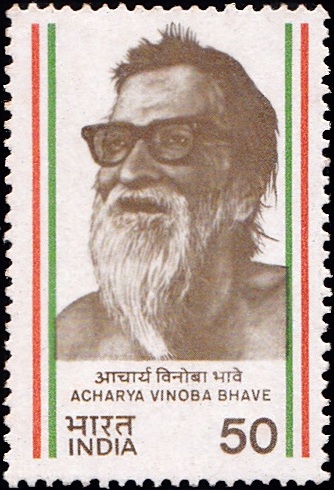
Acharya Vinoba Bhave
A commemorative postage stamp on the 1st Death Anniversary of Vinayak Narahari “Vinoba” Bhave, a National Teacher of India and spiritual successor of Mahatma Gandhi :
Issued on Nov 15, 1983
Issued for : Indian Posts and Telegraphs Department is privileged to issue a stamp in honour of this great freedom fighter.
Description of Designs : The stamp has been designed by India Security Press, Nasik. The first day cover is based on a sketch titled ‘Lead Kindly Light’ drawn by Gajanan Ambulkar. Cancellation has been designed by Alka Sharma.
Type : Stamp, Mint Condition
Colour : Dark Brown
Denomination : 50 Paise
Overall size : 4.06 x 2.73 cms.
Printing size : 3.70 x 2.40 cms.
Perforation : 13 x 13
Paper : Unwatermarked adhesive stamp paper
Number printed : 15,00,000
Number per issue sheet : 40
Printing process : Photogravure
Printed at : India Security Press
Name : Vinayak Narahari Bhave
Born on Sep 11, 1895 at Gagode, Raigad, Maharashtra, India
Died on Nov 15, 1982 at Paunar, Wardha, Maharashtra, India
About :
- Vinayak Narahari Bhave, commonly known as Vinoba, was born at Ganoda in Maharashtra, on 11 September, 1895. Educated at Baroda in the Government High School, he was a brilliant student, but he soon lost interest in conventional studies. He passed the Matriculation examination in 1913 and was due to appear for the Intermediate examination in 1916 for which he had to go to Bombay. Instead of going to Bombay, he detrained at Surat and proceeded to Banaras, where he studied Sanskrit and became proficient in all Hindu scriptural books. He was a self-taught multi-linguist.
- After Gandhiji’s return from South Africa early in 1915, Vinoba recognised in him the kindred-most of spirits and requested him to adopt himself as his spiritual son in 1916. In 1921, Jamnalal Bajaj requested Gandhiji to give him his best and most trusted lieutenant at Sabarmati Ashram to be sent to Wardha to start a similar Ashram. Gandhiji sent Vinoba. Jamanalal placed his whole family under his charge. Speaking about Vinoba, Gandhiji said, “He is one of the Ashram’s rare pearls – one of those who have come not to be blessed but to bless, not to receive but to give“.
- Vinoba lived in accordance with the eleven vows, included in Gandhian daily prayer, viz. non-violence, truthfulness, absolute honesty, chastity, poverty, manual work, temperance, fearlessness, respect for all religions, independence in the matter of money and non-recognition of cast distinctions. At the Ashram, he took up scavenging work and had “no trace of untouchability left in his heart“.
- He was one of the moving spirits of the Nagpur Flag Satyagraha, his companions being Jamanalal Bajaj, Bhagwan Deen and Nilkanthrao Deshmukh. In 1924, Gandhiji sent Vinoba to Guruvayur (Kerala) to participate in the Harijan Temple Entry Satyagraha. He participated in the famous ‘Dandi March‘ for Salt Satyagraha in 1930, for which he was again sent to prison.
- In April, 1951, he started the Bhoodan Movement, with a view to bringing about fundamental social and economical changes in society by peaceful means. The movement began by way of gifts of lands to be distributed among the landless, later developing into voluntary renunciation of ownership of land in favour of village communities – Gramdan. More than four million acres of land were collected in Bhoodan and 18,000 villages had been declared Gramdan or common ownership within 15 years of the launching of the movement.
- Vinoba wanted each village to be self-sufficient in food and clothing. His creed was, “Now that political freedom has been attained, we have to work for the establishment of equality. I have called that ‘Sarvodaya’. It is for the establishment of this that I am going from village to village“.
- On the pattern of Gandhi‘s Ashram at Sabarmati, Acharya Vinoba Bhave started his own Ashram at Paunar, near Wardha, where he continued to stay till his death on 15th November, 1982.
- (The above text is based on material published elsewhere and/or supplied by the sponsors).




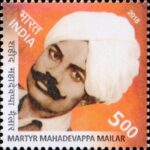
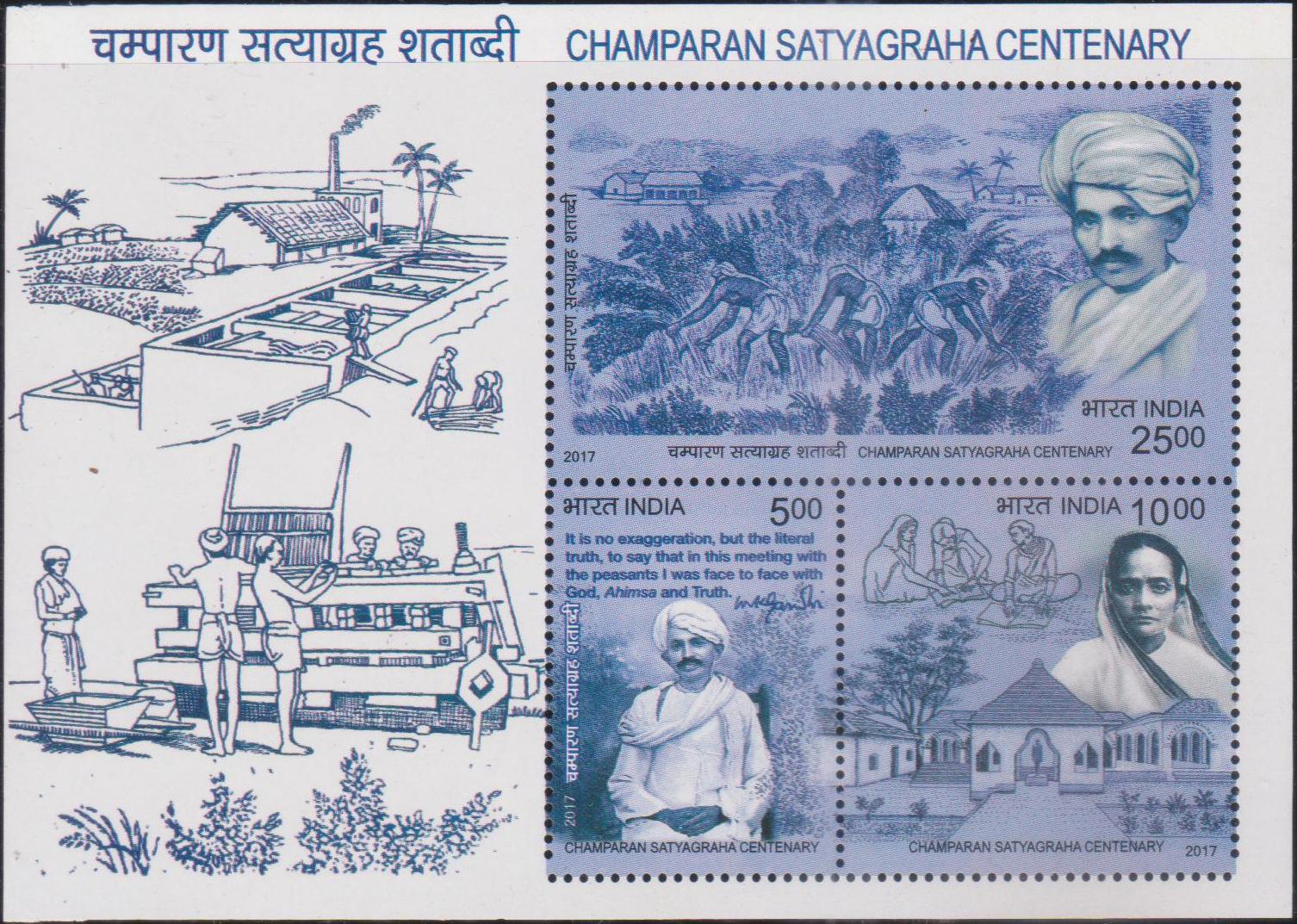
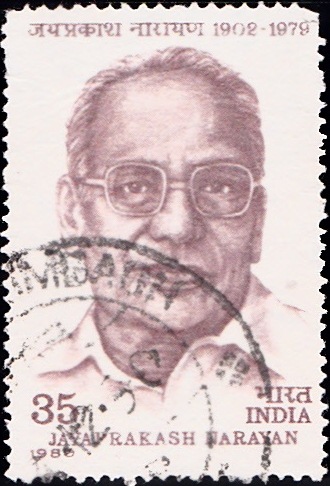
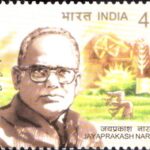
[…] Deshmukh also actively participated in Bhoodan Movement started by Vinoba Bhave. He spent two months with Vinoba, and was greatly inspired by the success and appeal of the […]
[…] announced withdrawal from active politics and joined Acharya Vinoba Bhave‘s Bhoodan campaign. He threw himself whole-heartedly into it. A Gandhian crusader by then, he […]
[…] philanthropist and a man of charitable disposition, he donated his land to the Bhoodan Movement of Vinoba Bhave and to other charitable institutions. As convenor of the J.P. Movement for Civil Liberties, the […]
[…] devoted to poetry. Inspired by the freedom fighters of his time and by such great personalities as Vinoba Bhave and Mahatma Gandhi, his poetry became the instrument for expressing his nationalistic feelings as […]
[…] Party. However in 1954, he made the dramatic announcement of total withdrawal from politics to join Vinoba Bhave‘s Bhoodan Movement. He went on to champion diverse causes like rural upliftment and reform of […]
[…] Vellala community, A. Vedaratnam Pillai was deeply influenced by Gandhiji, Vallabh Bhai Patel, Vinoba Bhave, Avinasilingam Chettiar, N. M. R. Subbaraman, O. P. Ramaswami Reddiar and C. Rajagopalachari whom […]
[…] Mandal on 26th September 1950 and obtained 450 acres of land from donors. It was inaugurated by Shri Vinoba Bhave. It is known as Tapovan today and is situated at Amravati, Maharashtra. The institute is devoted to […]